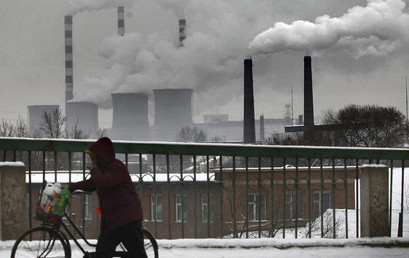Though climate change reform is the charge of the Democratic Party, the organization has allocated a disappointing amount of energy to pushing for new policy or even discussion of the issue. That’s why President Barack Obama took a significant step forward in his second State of the Union address by allocating eight sentences of his address to climate change – more than any other single issue. Obama gave hope that climate change will become a central concern in national policy instead of a disputed afterthought, and that, with or without the help of Congress, he will achieve a degree of reform.
The prominence of climate change in his speech attracted the usual attention from detractors of climate change reform. Charles Krauthammer published an op-ed in the Washington Post mocking Obama’s assertion that “The debate is settled. Climate change is a fact.” Krauthammer harped that the concept of “settled science” is ludicrous. He then ticked off various weather statistics that challenged climate change reformers’ claims that recent extreme weather events are indicative of the urgent state of global warming: “The last 30 years — of presumed global warming — has seen a 30 percent decrease in extreme tornado activity.” Krauthammer isn’t trying to disprove global warming. He’s saying that conclusions about climate science aren’t “settled.” Fortunately, during the State of the Union, the president was not arguing that climate science is “settled, static and impervious to challenge.”In fact, the president has been more cautious than most in his public statements about climate change. Former Mayor Michael Bloomberg tacitly attributed Hurricane Sandy and its ensuing damage to climate change, a claim that many say has weak scientific backing; the 2011 Intergovernmental Panel on Climate Change stated, “Attributing extreme weather events to climate change is challenging.” The president, in comparison, stated, “We can’t attribute any particular weather event to climate change.” In the same speech he stated, “What we do know is the temperature around the globe is increasing faster than was predicted even 10 years ago. We do know that the Arctic icecap is melting faster than was predicted even five years ago.”
Krauthammer’s op-ed epitomizes the main challenge climate change reform will have to contend with in the coming decades. Unfortunately, climate change debate largely consists of individuals’ (who for the most part are not scientists) personal conclusions based on the most recent statistics they’ve read. Krauthammer cites the British National Weather service’s concession that “there’s been no change… in global temperature in 15 years.” I couldn’t tell you if this fact is of any scientific significance and should influence the U.S.’s climate change policy, and neither could Krauthammer. But by publishing it along with a claim that that the president’s call for policy reform is founded on shaky ground, Krauthammer calls to question the legitimacy of climate change as part of the president’s agenda.
The Economist, a magazine that favors climate change action, responded to Krauthammer’s op-ed with an article on climate change skepticism. It wrote, “While science is more unsettled than some feel comfortable admitting, it nevertheless depends on some things being settled irrevocably.” As the Economist reports in its piece citing the authors of the Royal Society NAS/FAQ, one of these irrevocable truths is that the Earth’s temperature is warming. Though further conclusions about climate change (especially its relation to the tornadoes, draughts, and hurricanes that will hit the U.S. in the coming decade) are uncertain, climate change undoubtedly deserves national attention and concern. To ignore it and forego policy reform on the grounds that we don’t understand climate change’s definitive impact is foolish. But the power of skepticism is strong; climate change campaigners are desperately in need of powerhouse backers to override skepticism and force the issue of climate change reform onto the national stage and keep it there.
